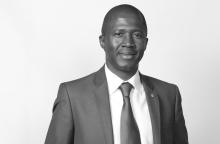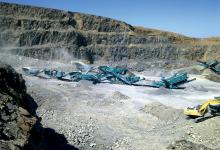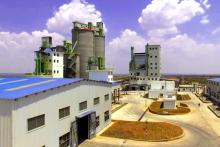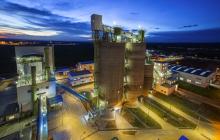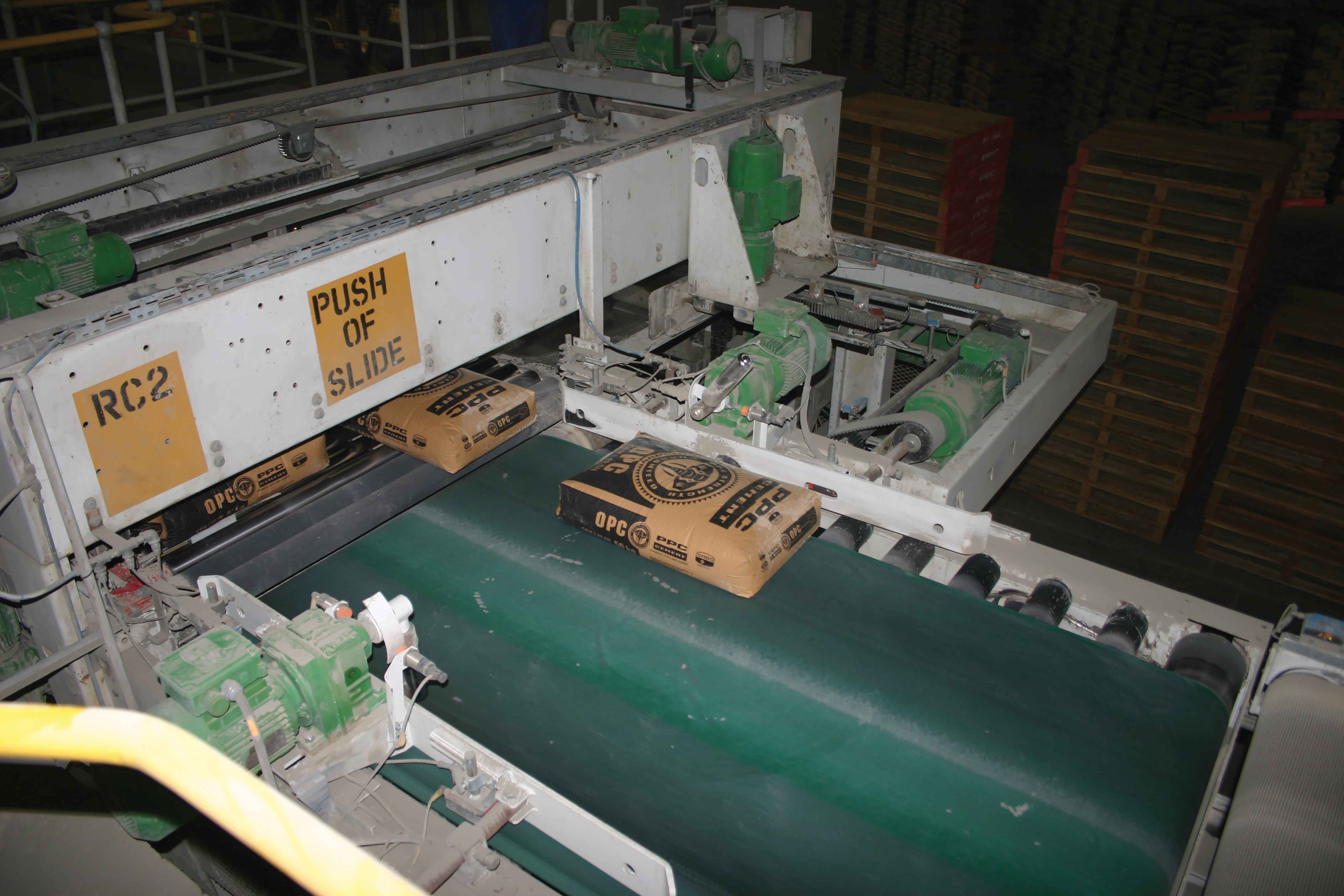
South Africa’s largest cement maker PPC has a bold vision to become a world-class provider of materials and solutions. Part of this plan entails doubling its business every 10 years. CEO Darryll Castle outlines to Munesu Shoko how he and his management team aim to deliver the company’s ambitious agenda.
PPC Ltd is a household name in the South African cement industry. Over the past few years, it has embarked on an African expansion programme that seeks to generate a big chunk of the company’s turnover elsewhere on the continent. For a company that has set itself some ambitious targets, appointing a renowned industry captain of Darryll Castle’s mould as its CEO in January 2015 was undoubtedly a strategic decision.
He brings to the table a wealth of intellectual capacity across various fields of civil engineering, commerce, financial analysis and, more importantly, management of business. For a company striving for global excellence and seeking to generate 40% of its revenues outside South Africa by 2017, Castle’s vast international experience and his first-hand exposure to the African business climate, as reflected by his largely mining background, is surely fundamental to ensuring that the company’s growth is unrestricted.
The task at hand is no walk in the park and this is well illustrated by Castle’s hectic schedule. Squeezing an hour out of his busy schedule was no easy feat for me either, and not because he was trying to avoid it, rather because his time is so carefully balanced between running the day-to-day operations of the company and being an executive director of the PPC board.
He did not have it easy from the outset. “I joined the PPC board in a directorship capacity at the end of 2014, which was quite interesting for me though the company was going through a lot of issues at the time,” he says, referring to the leadership vacuum created after the abrupt departure of his predecessor, Ketso Gordhan, in September 2014 following a public fallout with the cement maker’s board.
He, however, downplays the extent of the much publicised crisis at the time. “I think what happened to PPC was a much bigger issue in the press than it was internally,” says Castle. “Certainly the company was in a state of temporary limbo due to the leadership vacuum at the time, but it was not as damaging internally as was portrayed. PPC has a very professional approach and a very good workforce with most people having been here for many years. Everyone was keen to put that behind and focus on the future of the business.”
One of his immediate tasks after assuming the hot seat was to arrange for the executive team to consider a merger proposal from rival AfriSam. In December last year, PPC received a conditional, non-binding proposal from AfriSam Group that proposed, among other things, a merger between South Africa’s two biggest cement producers. The parties were not able to reach consensus on the terms of the merger and therefore terminated the discussions.
Due to the confidentiality agreements between the two parties, they could not elaborate on the detailed reasons for this termination. But, one of the burning questions I longed to ask Castle, though I left it last, was the reason why the merger failed. “You always have to look at co-production from different perspectives,” he explains. “Firstly, you look at it from a management perspective. Would we be comfortable in running a bigger company with a bigger balance sheet? The other aspect you need to consider is that the best deals happen when shareholder interests are aligned with management interests. In this case, certainly a merger would have created a bigger, more powerful company and probably a stronger balance sheet which could have allowed better opportunities to expand in Africa,” he says. “Unfortunately, the cost and uncertainty of creating such an entity would have been too high to the extent that investors wouldn’t have benefitted from it,” he explains. Merger and acquisition activity abounds in the global cement fraternity.
In line with global trends, would PPC be open to such a transaction in the near future? “Everything is a possibility but we are not focusing on it,” says Castle. “The reasons why the merger couldn’t happen are still valid today and, in fact, probably remain valid because they relate to the size of both companies in South Africa, they relate to competition issues and the complexities of dealing with these competition issues.”
Castle also came in at a time when PPC was driving an ambitious target to grow revenues outside South Africa from 23% at the time of his arrival to 40% by 2017. With several capacity building projects well in line to come on stream in several African markets, he believes these targets are “within reach”. “I am certainly positive that we will achieve those targets, but that’s just one milestone in a journey. The strategic aspiration of the company is to become a global major cement producer, growing through Africa. But, one of the milestones will be when we reach 40% of our revenue outside South Africa,” he explains.
Already, 28% of PPC’s revenue is generated from markets outside South Africa.
Castle delves into several of PPC’s African expansion projects under way, which he says are all progressing as planned. “We are extremely proud to have successfully commissioned our Cimerwa project in Rwanda on time and within budget, which is testament of our ability to manage complex, multidimensional projects in the heart of Africa.”
The modernised 600,000 tonnes/year CIMERWA plant, which switches from wet to dry-process technology, was officially opened in August 2015 and was already operating at 60% of its production capacity by the end of September 2015. The company has also installed a 15MW peat-powered power plant, which will help it address the unreliable electrical supply that has caused it to suffer high production costs for many years.
CIMERWA, owned 51% by PPC, is Rwanda’s only integrated cement producer and Castle believes the plant is strategic for the company. “The Rwandan plant is very well located in terms of that region. It’s well inland from the coast. It positions us at the centre of Rwanda’s inland growth,” he says.
Elsewhere, projects in the Democratic Republic of Congo (DRC), Zimbabwe and Ethiopia are all over 50% complete and Castle believes the target of generating 40% of revenue from the rest of the continent by 2017 is within reach. “As our remaining projects come on stream from the end of 2016, we will become a much more diversified business both geographically and from a risk perspective,” adds Castle.
Construction of the US$280 million, 1 million tonne/year plant in DRC is forging ahead. “The project is more than 50% complete. It will be commissioned at the end of 2016,” says Castle, adding that PPC owns 70% of this project. He believes the DRC is one of the countries in Africa with the greatest potential. “The country is vast and blessed with natural resources, which can be a driver for much needed economic growth. Of course, it’s coming off an exceptionally low base, especially having borne the brunt of political events of the past decade,” he says.
The US$85 million, 700,000tonnes/year mill in Harare is also 50% complete and on schedule for commissioning by the end of 2016. PPC also runs milling and clinker assets in Bulawayo and Collen Bawn, respectively. Castle believes the new plant is a vote of confidence in the future of Zimbabwe’s prospects, while it provides the cement maker with more efficiency by being closer to the Harare market. “One day I am sure Zimbabwe will experience good growth and there is a lot of potential in the country. We need to be there at the right time for that. Harare can also be a good market for us. This expansion is a bold step towards reducing our cost of selling cement in the Harare area,” says Castle.
Meanwhile, the 1.4 million tonnes/year plant in Ethiopia is being built at a capital cost of between US$170 million and US$180 million and commissioning is scheduled for the second quarter of 2017. As Castle explains, the history of the project is that it was founded by local Ethiopian entrepreneurs and it was funded via a public raising of funds. “We later became involved and currently own 31% of the project. The Industrial Development Corporation owns 20% and there are about 16,000 other local individuals who own the other 49% of the project,” says Castle.
“Ethiopia is one of the markets I am optimistic about. It has a reasonably stable political climate and the economy is being well managed. It requires a lot of investment into infrastructure, which obviously benefits cement demand,” he adds.
While the rest of Africa is still an opportunity space in PPC’s growth trajectory, the company is also driving a new group strategy. Its 2010 strategy focused on enhancing its industry leader position in southern Africa to “keep the home fires burning”, as well as expanding its footprint into other parts of Africa through the “rest of Africa” strategy.
“We have evolved our strategy. ‘Keep the home fires burning’ is now what we do. We recognise that Africa is not homogeneous – ‘rest of Africa’ sends the wrong message. Although South Africa comprises 70% of our business, it should be seen as a component of the group on an equal footing with all of our businesses and regions.”
Based on the new strategy, PPC aims to be a world-class provider of materials and solutions into the basic services sector, “taking a strategic approach to more than double our business every 10 years”. “In 2016, we will focus on articulating the measures accompanying the different elements of the new strategy and senior management has started to cascade the new vision and strategy to all business units.”
In line with the new strategy, PPC is establishing a vertically integrated materials business which will house the ready mix, aggregates and related building materials businesses. As part of its diversification programme, it recently acquired two different businesses, Safika and Pronto. “Safika is more of a blender. We are integrating it into our businesses and it’s helping us being competitive in the 32MPa end of the market,” says Castle.
“Pronto is a ready-mix concrete supplier. Pronto will definitely give us an edge in the highly developed urban areas where ready-mix will play a major role in being a channel to the market for cement, mainly driven by space and environmental constraints. The ability for concrete companies to do batch processing on site is becoming more and more difficult,” reasons Castle. PPC is looking to boost its ready-mix business by setting up in different locations nationally. At the moment, Pronto is very focused on the Gauteng province, and mostly Johannesburg.

